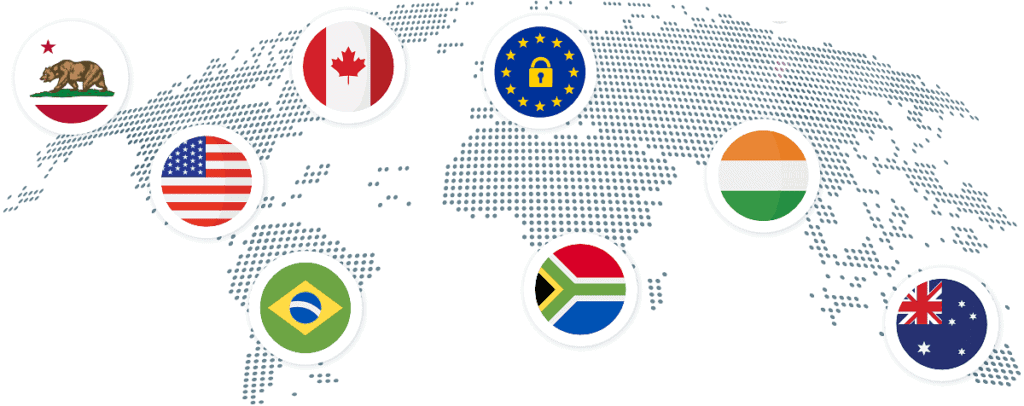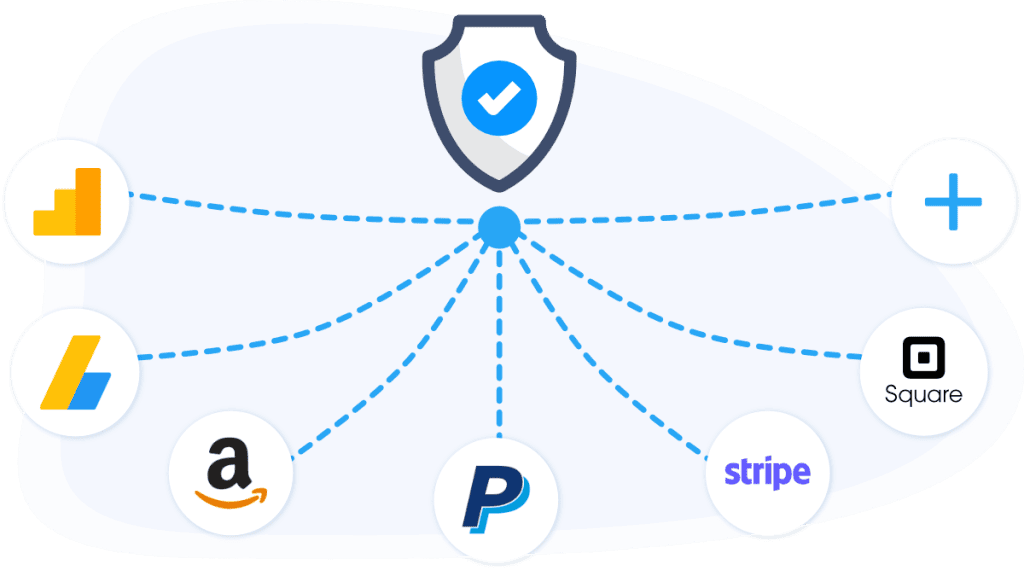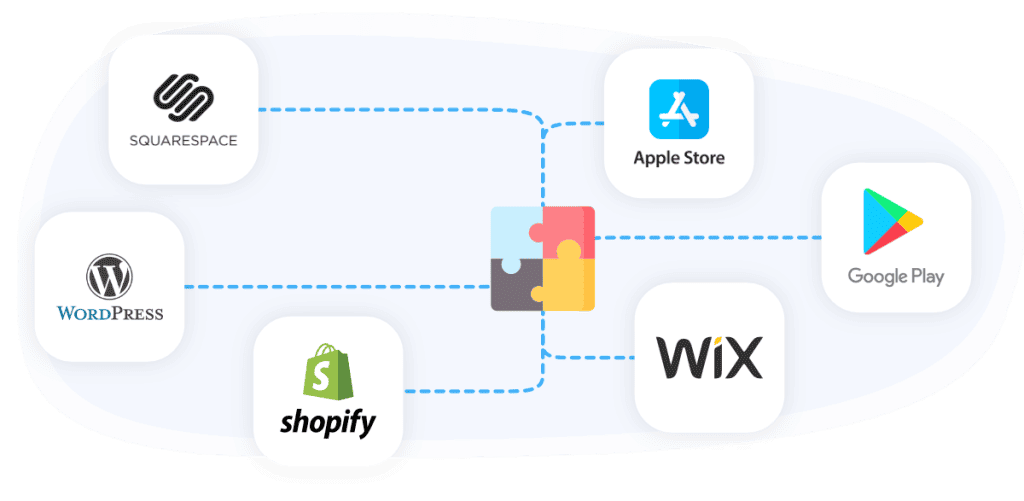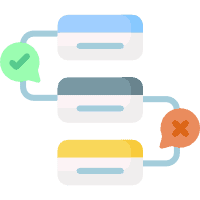Free Privacy Policy Generator
Create a flawless privacy policy personalized to your needs & ensure compliance with global privacy standards effortlessly without any guesswork.
GET STARTED

Get Compliant With Data Privacy Laws
Global Privacy Laws Coverage
Align your business with key international regulations including the GDPR, CCPA, CPRA, PIPEDA, CalOPPA, and other privacy laws around the world.
Compliance You Can Rely On
Take advantage of having data privacy experts on your side without breaking the bank and craft a comprehensive privacy policy your customers will love.

Meet Third-Party Requirements
Advertising and Remarketing
If you have affiliate links, display ads, or run marketing campaigns, you need to follow third-party requirements to stay compliant and keep your earnings safe.
Payments processing
Handle your customers’ sensitive personal information safely by including the necessary statements as required by PayPal, Stripe, Square, etc.
Website Traffic Analysis
Transparency is key when monitoring your website’s traffic and is part of the requirements of analytics tools like Google Analytics, Matomo, Clicky, etc.

Built & Tailored to Your Business Needs
Suitable For Any Online Business
Your privacy policy will be tailored to your specific needs whether you run a website, blog, eCommerce store, SaaS, or mobile application.
Integration With Major Platforms
Ensure seamless integration for a consistent user experience with your favorite platforms including WordPress, Shopify, Wix, Squarespace, or others.

How Does Our Privacy Policy Generator Work?
Our smart privacy policy generator takes the guesswork out of the legal jargon with an easy step-by-step process anyone can follow.

1. Tell Us About Your Business
Answer a few questions in our smart privacy policy questionnaire to describe your business and how you operate it.

2. Download & Publish
Download the completed privacy policy or publish it on your website or app using one of the several available options.

3. Stay Up to Date
Your privacy policy will be automatically updated whenever laws change so you’ll never have to worry about it again.
Everything You Need in One Place
Personalized to Your Needs
Our smart privacy policy generator will ensure your documents are tailored to your specific needs to fit exactly what you do and how you operate.
No Legal Jargon Guesswork
Save hours of research and take the guesswork out of the legal jargon. Have your privacy policy ready in minutes with the easy step-by-step process.
Built-in Compliance
Manage data subject access requests and cookie consents with built-in tools that ensure your website adheres to global privacy regulations.
Backed by Legal Experts
All policies are curated by a team of legal industry experts to maintain compliance and ongoing protection and give you peace of mind.
Multiple Languages
Your privacy policy will be available in 25+ languages ensuring compliance and accessibility for your global audience.
Automatic Updates
We will automatically update your privacy policy to meet the latest laws, regulations, and requirements as they evolve over time.
Save on Legal Fees
Create your privacy policy for free or take advantage of additional coverage and tools at a fraction of the cost of hiring a lawyer.
Easy to Install
No technical knowledge is required to create and add the policies to your site or app with multiple installation methods available.
Hear it From Our Customers
No joke, I can’t believe how easy and fast it was to go from “How the heck am I going to write this privacy policy?” to “Here is the public URL for my company’s completed privacy policy!” Thank you for the awesome service, so worth it!

Excellent service. California is its own intricate legal tightrope tango, so having the understanding to craft a privacy policy that is ironclad to protect your users and your company is essential. Thank you!

Creating a privacy policy for my website was a snap. The online questionnaire was simple to fill out and made me feel confident that I now properly inform my visitors of their privacy and my site’s use of cookies.

Frequently Asked Questions
Yes, it is required by law for any website or mobile app to have a comprehensive privacy policy. The policy should inform users about how their data is collected, stored, and used. Even if you don’t collect any data, you should still have a privacy policy.
Yes, our generator is designed to produce legally compliant privacy policies tailored to meet the requirements of key regulations such as GDPR, CCPA, CPRA, PIPEDA, and many more. All policies are continuously reviewed and updated by a team of privacy experts to ensure accuracy and compliance.
Not having a privacy policy can lead to various legal consequences and financial losses. You could also lose the trust of your users. If you have a mobile application, some app stores may even remove your app if you don’t have a privacy policy in place.
Most people complete the online questionnaire in less than 10 minutes. Once finished, our system will automatically generate a comprehensive privacy policy for you based on your specific answers, which will be accessible in your account right away.
Yes, you can re-run the questionnaire and customize your privacy policy if you’d like to change something to suit your needs better. You can also change the appearance of the privacy policy if you’d like to embed it on your website or app to match your own theme.
Yes, you can add specific clauses to your privacy policy in case you’d like to address any additional requirements that are relevant to your business model.
Your privacy policy will be available in 25+ languages, including Bulgarian, Croatian, Czech, Danish, Dutch, English, Estonian, Finnish, French, German, Greek, Hungarian, Irish, Italian, Latvian, Lithuanian, Luxembourgish, Polish, Portuguese, Romanian, Russian, Slovak, Slovenian, Spanish, Swedish, and Turkish.
Yes, you can download or copy your privacy policy once it’s generated. We provide several different formats of the policy text so you can choose whatever works best for you.
Yes, we will host your privacy policy for you so you can link to it from your website, mobile app, Facebook page, or anywhere else.
Our data privacy experts continuously monitor data privacy and protection laws and requirements and make appropriate updates to the privacy policy generator and related documents. The frequency of updates varies based on regulatory changes, the latest legal standards, industry practices, and the evolving legal landscape.
Yes, our privacy policy generator is free. Sign up to create and add a privacy policy to your website or app in minutes. We also provide cost-effective pricing options that come with extra features to ensure your complete legal coverage and guarantee your peace of mind.
Don’t Risk Non-Compliance & Fines
Start now and create your personalized privacy policy in minutes. No credit card required.
GENERATE YOUR privacy policy